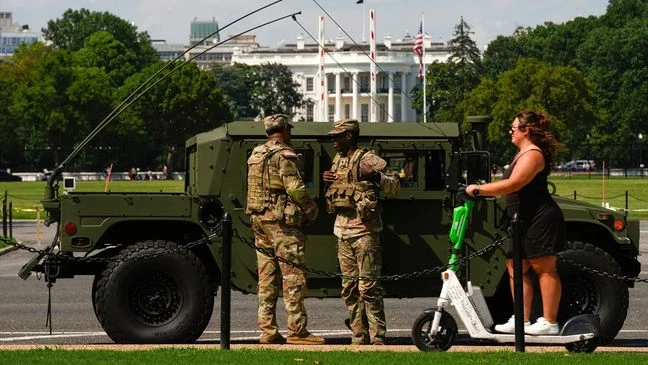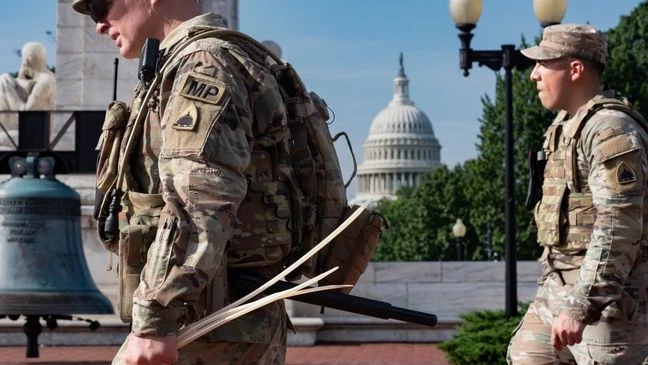Ohio Governor Mike DeWine said sending National Guard troops to Washington, D.C., was “the right thing to do.” His remarks came as Ohio deployed 150 members of its National Guard, specifically trained military police, to the capital. The move was made at the request of the Secretary of the Army, as part of a larger federal effort led by President Donald Trump to increase security in Washington.
DeWine stressed that Ohio’s decision was not politically motivated but a response to a federal request for support. He explained that Ohio Guard members would not be involved in civilian policing within the state but would focus on presence patrols and federal security duties in the capital.
Federal Deployment in Washington
The deployment is part of a broader initiative announced by President Trump, who declared a “public safety emergency” in Washington, D.C. The move included federalizing the city’s police force and expanding National Guard presence in the area.
Initially, about 800 members of the D.C. National Guard were activated. Additional troops are now being sent from multiple Republican-led states. West Virginia is sending between 300 and 400 soldiers, South Carolina is sending 200, and Ohio is contributing 150. Together, these deployments could nearly double the Guard’s presence in the capital.
The stated purpose of the deployment is to strengthen security, protect federal buildings, and support law enforcement. While the troops will assist with patrols, they are not authorized to arrest civilians.
Governor DeWine’s Explanation
Governor DeWine clarified that Ohio’s participation was not initiated by him but by a request from the federal government. He emphasized that when the Army asks for assistance, the right response is to support them.
DeWine said the 150 Ohio Guard members are military police who have the training and discipline needed for this type of mission. He assured Ohioans that none of these Guardsmen are currently serving as local police officers in the state, so their deployment will not affect law enforcement at home.

He also described the request as consistent with past situations where Ohio has supported federal security needs or assisted other states during emergencies. Calling the move “the right thing to do,” he presented it as both a duty and a contribution to national security.
What the Guard Will Do in D.C.
The Ohio National Guard, like others being sent, will primarily perform presence patrols and provide support for federal security. Their tasks are designed to supplement law enforcement, not replace them.
While Guard troops will be visible on the streets of Washington, officials have made clear that they are not currently authorized to engage directly in policing or arresting civilians. Instead, their presence is intended to deter crime, support law enforcement operations, and help manage public order during heightened tensions.
There have been discussions that some Guard members may eventually carry weapons, which would mark an escalation in their role. For now, however, they are primarily there for visible security and deterrence.
Local Opposition in Washington
The deployment has not been welcomed by everyone. Washington, D.C., Mayor Muriel Bowser has been outspoken against the move, saying the city does not need outside troops. She pointed out that crime rates in Washington are at their lowest in decades and argued that federal intervention was unnecessary.
Other city officials and legal experts have raised concerns about the constitutional issues involved. Washington is not a state and does not control its own National Guard, leaving it vulnerable to federal decisions. Critics say this makes the city’s residents subject to military presence without the same level of local oversight that states enjoy.
Local activists and residents have also protested the deployment, seeing it as a politically motivated show of force. Demonstrations have taken place across the city, with many calling for federal authorities to step back and allow the city to manage its own security.
Broader Political and Legal Concerns
The decision to send National Guard troops to the capital raises larger questions about federal and state roles in domestic security.
First, the move highlights the tension between federal authority and local control. Washington, D.C.’s lack of statehood has long been debated, and this deployment underscores the city’s limited power over its own policing.
Second, the involvement of out-of-state Guard troops has been criticized as unnecessary and potentially provocative. Critics argue that it sets a precedent for using state military forces in political disputes, rather than emergencies.
Finally, the legal limits on military involvement in civilian law enforcement remain a point of concern. The Posse Comitatus Act restricts the use of the military in domestic law enforcement, but National Guard units under state authority can sometimes be used in ways that skirt this line. By federalizing the request, critics worry that these limits are being tested.
Why Ohio’s Support Matters

Ohio’s participation is significant both symbolically and practically.
Federal-State Cooperation
By agreeing to the request, Ohio shows strong support for the federal initiative. This strengthens the appearance of unity behind Trump’s emergency measures.
Political Messaging
By calling it “the right thing to do,” DeWine signals political backing for the federal narrative of increased crime and the need for strong security.
Practical Reinforcement
The Ohio Guard brings military police expertise, making them valuable in patrol and security roles. Their deployment demonstrates how state troops can be used in high-profile federal operations.
Public Perception
While DeWine presented the decision as routine and cooperative, it inevitably carries political weight. His words show Ohio aligning with the administration, which could resonate differently among his supporters and critics.
Reactions in Ohio
Within Ohio, reactions have been mixed. Supporters see the deployment as a patriotic duty, part of the state’s responsibility to national security. They argue that if the federal government asks for help, it should be given.
Opponents, however, see the move as unnecessary and politically driven. Some argue that Ohio’s resources should remain within the state and not be used in a federal political dispute. Others worry that Ohioans are being drawn into an escalating situation in Washington that does not directly concern them.
Conclusion
Ohio Governor Mike DeWine’s decision to send 150 National Guard military police to Washington, D.C., has become part of a larger national story about federal authority, local autonomy, and the role of the military in civilian spaces.
By calling it “the right thing to do,” DeWine emphasized duty, cooperation, and federal-state partnership. The troops’ mission is limited to patrols and visible security, but the symbolism of their presence is far larger.
Supporters argue that the deployment strengthens security and reflects a responsible response to federal needs. Critics see it as unnecessary, politically motivated, and troubling for democracy.
As the debate continues, Ohio’s role shows how state-level decisions can shape national discussions about power, security, and civil liberties. The question now is not only whether this deployment is effective but also what it means for the future relationship between states, the federal government, and local communities.
Read Next – Ukraine supporters rally near White House ahead of Trump-Zelenskyy meeting






